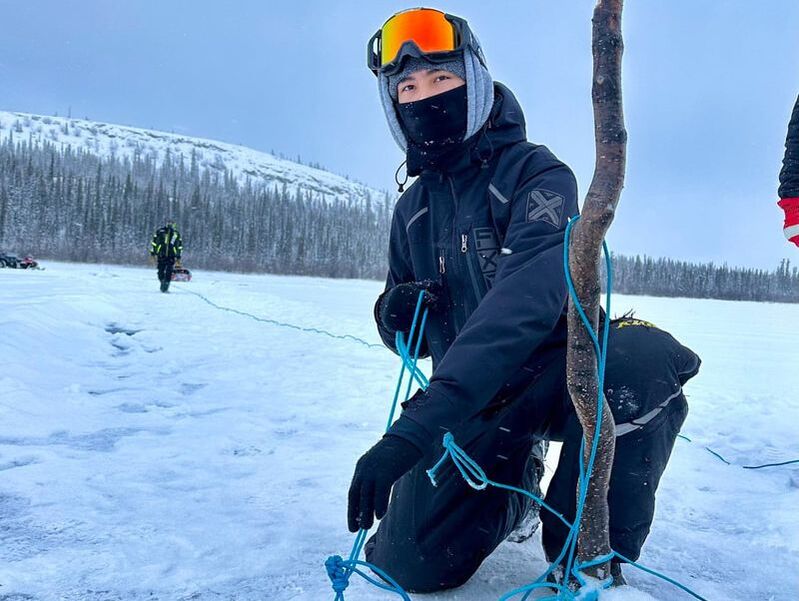 In 2022, Tanner Catholique was hired on as a summer student in Łutsël K’é’s Thaidene Nëné Department. The highlight of the summer was spending time on the water and visiting different places in the protected area. “We went on a couple of camping trips that I really enjoyed. We went to Reliance and to Wildbread Bay. We also did a lot of fishing. I really like fishing,” says Tanner. As a side note, when asked about the biggest fish he ever caught, Tanner reported that it was a 35-pound trout. Lucky for him, he landed it during a fishing derby. He came first and won $5,000 for his efforts. When Tanner learned that the Thaidene Nëné Department was looking for full-time guardians in June 2023, he applied. “I enjoyed my summer position,” he says, “so I thought I might like being a guardian full-time. Also, I didn’t want to sit behind a desk.” Ni Hat’ni Dene are more likely to be found sitting on skidoos or boats than at desks. Shortly after he started work as a guardian, Tanner was sent out on patrol. “We went to Taltheilei Narrows. We cleaned up an old cabin there.” Other activities in his first six months on the job have included hauling lumber to the new cabin site at Old Snowdrift and working with the lead carpenter on the build. “We’ve also been harvesting animals like moose, muskox, fish, rabbits, grouse, etc, and sharing that with community members and Elders,” Tanner explains. Tanner likes the fact that being a guardian allows him to stay active. He also appreciates the many and varied learning opportunities that come with the position. “I’ve been learning things like basic maintenance of quads and skidoos, how to site a gun, how to skin different animals,” he says. As he works alongside the older guardians, as well as Elders and knowledge keepers, Tanner is also being exposed to and absorbing critical Łutsël K’é Dene knowledge. Tanner says it was his mom, Iris, who showed him how to be on the land. “She brought me out to the Barrenlands when I was young.” Tanner was nine or ten when he harvested his first caribou near Ɂedacho Tué (Artillery Lake). “My papa [Matthew Fatt] had to hold my shoulder because the gun kicked me back.” Tanner is quiet and reserved, but he laughs when he tells this story. When he’s not working with the guardians, Tanner likes riding around on his skidoo or quad. He also enjoys going out on the land with his grandparents. “Granny always asks me to bring her out to Tomato Island for berry picking, making fire, catching fish, cooking the fish,” he says. Tanner identified two places in Thaidene Nëné that are special for him: Desnéthchée and Ts'ąkuı Thedá. Speaking about the spiritual gathering site, Tanner says, “I like how the community gets together there each year.” He also feels fortunate to have had a chance to visit Ts'ąkuı Thedá, the old lady of the falls. Tanner doesn’t see a lot of other young people in the community who are interested in doing the kinds of things he is doing as a guardian, but he hopes that changes because, in his words, “protecting Thaidene Nëné is important.” 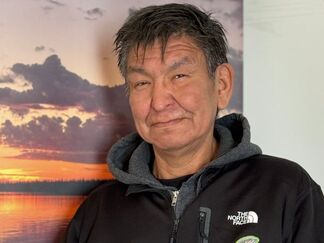 Arthur Rabesca joined the Ni Hat’ni Dene crew in July 2023. He’s spent the last eight months patrolling Thaidene Nëné, interacting with visitors, cleaning up sites around the protected area, building and renovating cabins, and taking kids out on the land. The best part of being a guardian has been providing for his home community of Łutsël K’é. “Seeing the faces of the Elders when you hand them the goodies, seeing the smiles on their faces, that’s the highlight of my day.” Arthur was raised to help and to see the value of helping. “My grandpa always said, You’ll be very lucky, blessed if you do all that good stuff for other people. It will come back to you.” Helping others was one of a number of important lessons that Arthur learned from his grandparents, Mary Louise and J.B. Rabesca, who raised him. “My grandpa taught me the traditional ways. He taught me my language, trapping, hunting, fishing. He taught me to respect the land and the animals, to only take what you need. He had good wisdom.” Arthur grew up in town, in Łutsël K’é, but his grandparents took him out on the land every chance they got. “We would go hunting around the Łutsël K’é area. We’d go all the way down to Basile Bay, hunting, fishing, trapping. I know all of the area down that way.” One of the things that has been interesting for Arthur since becoming a guardian has been spending more time on the tundra. “I’d hardly been out on the barrenlands before this job, just a few times by plane when I was working with the mining companies. It’s different out there. I’m learning as I go. We all do.” Arthur is thankful for the opportunity with the Thaidene Nëné Department because it’s allowed him to come home. “I worked in the mines for about 10 years, from exploration camps to mining camps. I got tired of it. I got tired of being away from home. It’s not a job for a person with a family.” Arthur wanted to be a guardian because of the way that he was raised. “I wanted to teach others, like kids and people that don’t know. I wanted to teach them about the land, the language, the culture, our heritage. They need to learn all of that stuff, so they can pass it on to their families.” Arthur has three children and five grandchildren, so he’s aware of the other things that compete for young people’s attention. “Kids are too much into games and the internet. They’re not into learning their culture. I want to get them learning how to be on the land.” Arthur feels a deep responsibility to the land of his ancestors and also to future generations. “We have to take care of it, protect it from development, from mining,” he says of Thaidene Nëné. Arthur has firsthand experience of the impacts of mining, having worked on mines at different stages of development. “When I worked at exploration camps, it was so beautiful at the beginning. The lake, caribou, everything. Now I look at the mine and it’s one big hole, there’s no water. All that just for a little piece of rock. I don’t want to see that happen to Thaidene Nëné. We have to leave something for our kids.” When asked to name a special place in Thaidene Nëné, Arthur talked about Ts’ąkuı Thedá Dezé (Lockhart River) and Ts’ąkuı Thedá (Lady of the Falls). “Those are spiritual places,” he explains. “If you believe in the stories behind them, you will be taken care of.” He also has fond memories of the area around T’u Chogh Ka Tł’áázı̨ (Basile Bay), where his grandpa raised his family and where he used to trap and fish. “The house is gone, but the spot is still there. I go by sometimes because it reminds me of him. Reminds me of sitting by the woodstove in candlelight, listening to him tell stories. I’ll never forget what he taught me.” 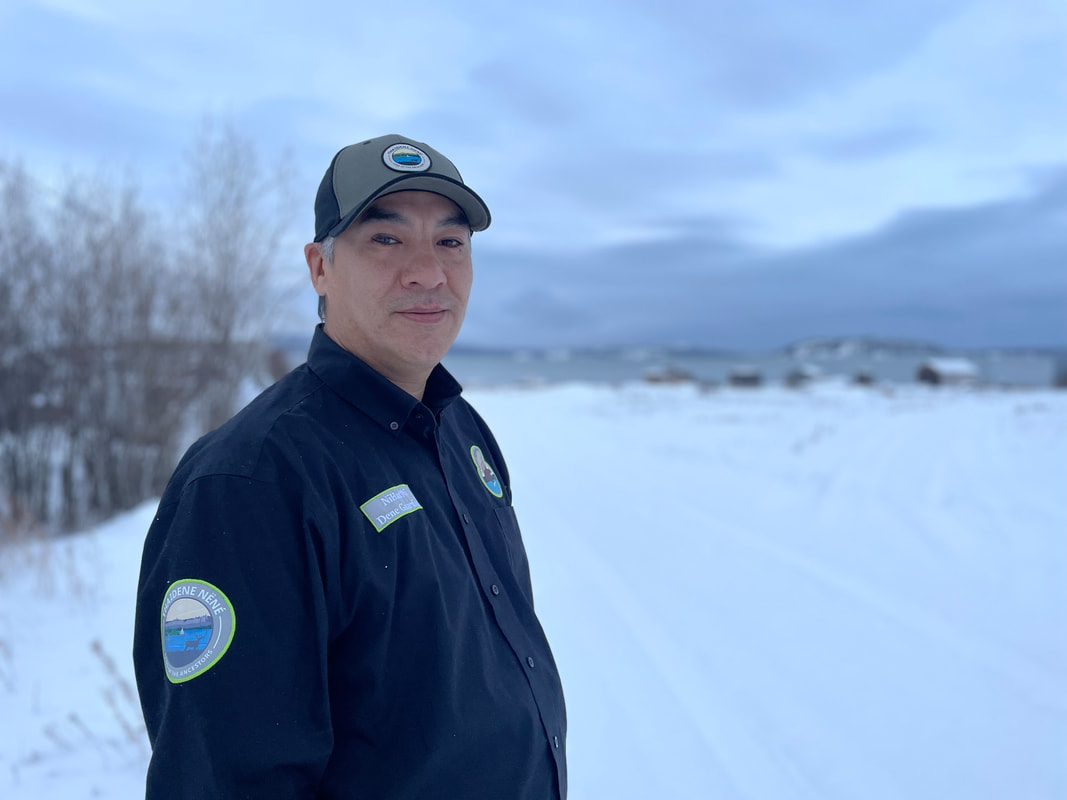 Adrian Nataway wanted to be a Ni Hat’ni Dene guardian because, in his words, “the land, the water, the animals, they mean everything.” “It is important,” he says, “that we are watching, that we are paying attention to how the land, the water, and the animals are doing, that we are noticing any changes.” The Ni Hat’ni Dene crew have accomplished quite a bit since Adrian started in July 2023. “We put up seven platforms at different places in the protected area. We tore down one old cabin, did a retrofit of another cabin, and now we’re building a new cabin at Old Snowdrift. We also provided food security during the fires and evacuation by harvesting meat like muskox, moose, and rabbits, and fish, and sharing it with community members.” Adrian attributes the guardians’ accomplishments to having such a big and knowledgeable crew. “We’ve been doing a lot of different things,” he says. “It makes it easier because there are so many hands and those hands know what they’re doing.” Adrian made a special point to say how much he likes working with people of different ages. “These young guys make you feel so energetic!” Likewise, Adrian is appreciated by his colleagues for what he brings to the job, not least of which is his work ethic. Adrian is also a people person. He likes meeting and interacting with visitors to Thaidene Nëné. He also has a knack for fixing things. His training and experience in small engine repair often come in handy. Adrian was raised in Łutsël K’é by his grandparents, Bruno and Marie Nataway. They taught him how to live on the land, how to hunt, and camp. But perhaps most importantly they passed on their language. Adrian is fluent in Dënesųłıné yatı. This has been invaluable for Adrian in his work as a guardian because he is able to communicate with the Elders. Adrian lived away from Łutsël K’é for a while. He returned to the community almost two decades ago. Even after he moved home, work took him away from his common-law partner, Stephanie, and their children. “You miss lots during your two weeks away,” he says about the years working in the mines. “It’s nice to be able to stay home, to have a job here.” While all of Thaidene Nëné is important to Adrian, Ts’ąkuı Thedá (Lady of the Falls) on Ts'ąkuı Thedá Dezé (Lockhart River) is particularly special. He’s done the hike from Desnéthchée to the falls. “It’s quite the trip,” he says. “You’ve got to be physically fit because it’s a physically demanding trail. It’s also a hard trail to find if you don’t know it, but it’s worth it to be there with her.” Adrian was a band councillor during the negotiations. “I wanted Thaidene Nëné to be so massive,” he remembers. “The whole time they just kept making it smaller and smaller. A lot of things got left out.” He hopes that the area under protection can be increased through the Akaitcho land claim process. “When we do our land claim, we should have a buffer zone around the current boundaries so we have even more protection. Thaidene Nëné is just one step. It’s important that we think in that way.” 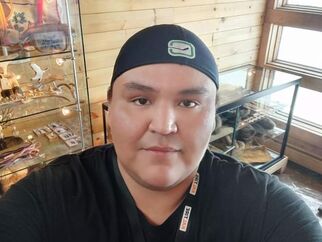 When Sunrise Lockhart, who was born and raised in Łutsël K’é, returned to the community after graduating from high school in Fort Smith, he worked with the recreation department, where he gained valuable experience delivering and later designing and managing programming. From there, he was hired on as the youth coordinator, a position that further expanded his administrative skills. While he enjoyed this work, he found himself spending all of his free time on the land, reconnecting with the knowledge and skills that had been passed on to him by his family. Sunrise’s earliest memories on the land are with his paternal grandparents, Bernadette and Joe Lockhart. They would take him out whenever they could, for picnics on the side of the road, visits to their cabin, and hunting trips further afield. As Sunrise got older, he and his family, including his parents, James and Sandra Lockhart, and brother, Chase, would go out with other families, spending weeks at a time camping and harvesting. As he rediscovered his connection to the land and his Łutsël K’é Dene culture, Sunrise started to seek out work opportunities that would allow him to spend time in the bush, which is how he ended up at the cultural exchange camp, a gathering of Dene from Łutsël K’é and Maori from Aotearoa (New Zealand) at Ɂedacho Tłaze (Timber Bay) on Ɂedacho Kúe (Artillery Lake) this past September. Working alongside Ni Hat’ni Dene, the Indigenous guardians of Thaidene Nëné, Sunrise was responsible for making sure the camps were set up well and had wood and water. “I liked the work environment,” he recalls. “Being out on the land but also being part of a team. You accomplish things when you work together.” Coincidentally, as the gathering ended, the department was looking for a new coordinator for the Ni Hat’ni Dene program. In addition to being attracted to the work environment, Sunrise welcomed the opportunity to give back to his community by supporting the guardians. “We face challenges in Łutsël K’é,” he explains. “The Thaidene Nëné Department is doing important work, helping out with employment, offering meaningful programming, promoting cultural activities, providing educational opportunities.” Like so many in the community, Sunrise loves spending time at Kaché (Fort Reliance). Desnéthcheé, the spiritual gathering that draws Łutsël K’é Dene to Reliance each summer, started around the time that Sunrise was born, so he grew up attending the gathering. It remains an important part of his summer plans. Ɂedacho Kúe is another special place for Sunrise, a destination for harvesting in the fall and the winter: “I look forward to going up there to hunt for caribou, to fish and trap, but also just to walk on the barrenlands.” Looking to the future, Sunrise would like to see more involvement from the community in the protected area. “Thaidene Nëné is important because our way of life is out there,” he explains. Not only do Łutsël K’é Dene depend on the land for sustenance, but who they are as Indigenous people is rooted in the land. In addition to sustaining a way of life, spending time on the land is important for wellbeing more broadly. “Being out on the land is good for you physically,” Sunrise believes. “It also gives you a sense of purpose.” Perhaps not surprisingly given his background, he wants to ensure there are opportunities for young people to learn and ultimately to participate in protecting their land. “Elders are disappearing,” Sunrise observes. “It is important that we conserve their ways and pass that along to the younger generations." 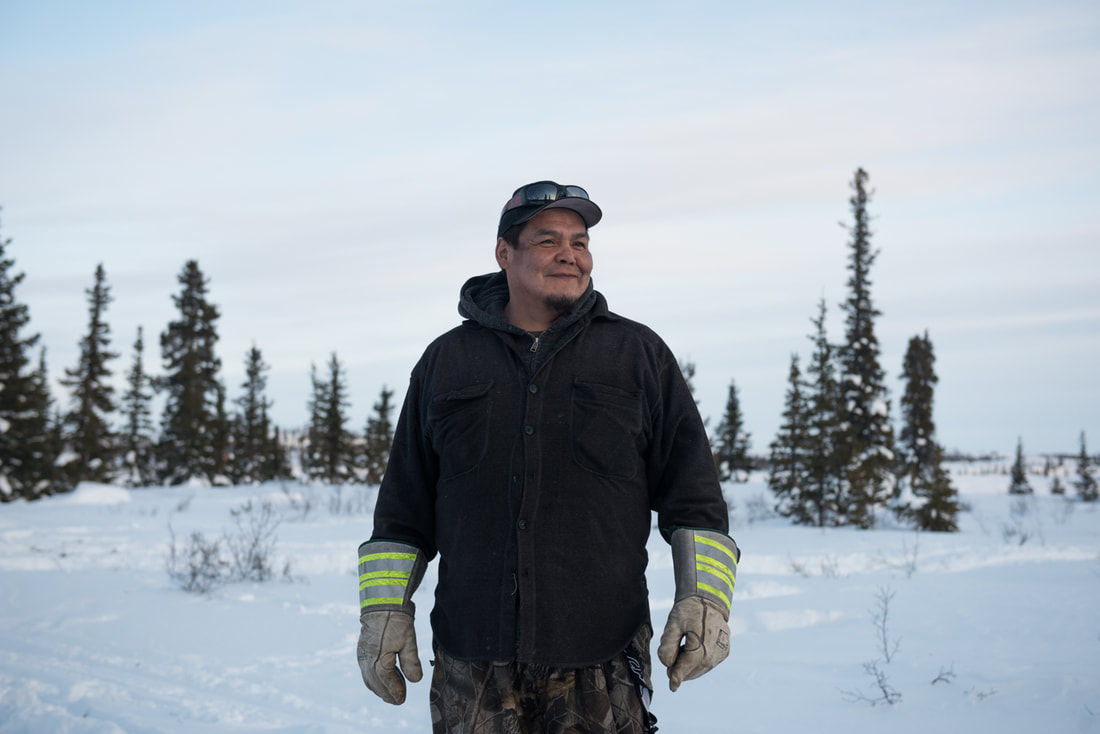 Rubin Fatt became a Ni Hat’ni Dene guardian in July of this year, a notoriously busy time for Łutsël K’é’s Thaidene Nëné Department. “Denecho [Catholique] and I were out on the land all summer,” he recalls, referring to one of the other guardians. “We were patrolling, travelling back and forth to Reliance to work on the cabin and get ready for the spiritual gathering, putting signs up, hosting visitors.” Thankfully, Rubin had previous experience working with the department as a contractor, so the learning curve wasn’t too steep. Born and raised in Łutsël K’é, Rubin learned how to be on the land from his maternal grandparents, Mary and Pierre Fatt. “When I was a kid, we would go in the bush lots,” Rubin remembers. Rubin also credits his late godfather, Sammy Boucher, with teaching him how to travel and live on the land, but in particular, teaching him about trapping. Rubin is happiest when he is in the bush. “I love camping in every season, summer, winter,” he says, and he prefers to get his food from the land instead of the Coop. “My family likes traditional food, so I’m always out setting nets, going for ptarmigan.” He also keeps busy cutting wood. “I always have a lot of wood,” he adds, with a laugh. Rubin’s favourite place in Thaidene Nëné is Kaché (Fort Reliance). He has fond memories of visiting Madeline Drybones’s cabin, “Madeline was my mum’s mum’s sister. Every year when I was a kid, we would go and camp at her place, me, my uncles, and friends.” He also likes attending the annual spiritual gathering at Desnéthcheé. Rubin welcomed the creation of the Thaidene Nëné Indigenous Protected Area in 2019. “It’s good to protect our land, our animals, and our water from mining,” he says. “It’s good for our future, for our kids’ future, and their kids’ future.” In addition to ensuring permanent protection for the land of the ancestors, Thaidene Nëné has meant jobs, good jobs that are based in the community, for Łutsël K’é Dene like Rubin. And while he is thankful to have work that he enjoys and that pays well, he also recognizes there are others in the community who need jobs. Looking to the future, Rubin would like to see more employment opportunities connected to the protected area for local people. |
AuthorWrite something about yourself. No need to be fancy, just an overview. Archives
July 2024
Categories |
CONNECT |
VISIONWe are the Lutsel K’e Dene First Nation. Our vision for Thaidene Nëné is:
Nuwe néné, nuwe ch'anıé yunedhé xa (Our land, our culture for the future). We’re working with our partners to permanently protect Thaidene Nëné—part of our huge and bountiful homeland around and beyond the East Arm of Tu Nedhé. |
